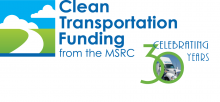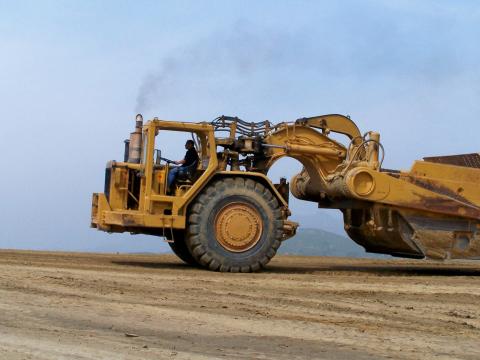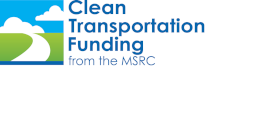
The MSRC is turning 30! To celebrate three decades and hundreds of millions of dollars in investments in clean air projects, Clean Air Roadmap will feature 30 projects over the coming year to showcase how the MSRC has helped transform the South Coast’s transportation sector into a leader in cleaner technologies, infrastructure and mobility programs.
Former California Assemblymember and Senator Byron Sher helped establish the MSRC in 1990 with the passage of California Assembly Bill 2766. The law was enacted to provide Clean Transportation Funding to projects that reduce air pollution from motor vehicles, funded through a small surcharge on vehicle license fees. Regional policymakers recognized that the South Coast basin faced unique air quality challenges, and needed additional funding to invest in initiatives that would reduce pollution from motor vehicles – thus, the MSRC was created to bring together diverse perpsecives on the air quality problems in the South Coast basin.
“The MSRC’s 30 years of clean air programs is truly impressive,” said MSRC Chair and City of Highland Mayor Larry McCallon. “The collaboration among our members over the years and the projects that have come from their work are incredibly inspiring because we’ve always wanted the same thing – clean, healthy air for our communities.”

This year-long retrospective will feature just some of the amazing clean air projects the MSRC has helped to fund over the years, resulting in more than $450 million in investments that have helped remove as much as 13,000 tons of air pollution from Southern California’s skies. This representative sampling of projects demonstrates the importance of the MSRC and showcases the creativity and determination of the MSRC’s project partners. To kick off the celebration, here are six exciting projects that the MSRC’s Clean Transportation Funding helped launch:
- The Showcase Program (2007)
The MSRC matched compatible diesel emission control devices with appropriate off-road construction equipment to demonstrate systems designed to achieve PM reductions of 85 percent, or emission rates of less than .01 grams/brake horsepower hour. In conjunction with the South Coast AQMD, the program provided nearly $5 million to fund 16 manufacturers to showcase 30 devices for 230 pieces of off-road equipment from 18 fleets. As a result of these investments, these systems became more prevalent in off-road construction equipment reducing pollution from these types of vehicles in our region. (see photo)
- “Pick a Day - Any Day,” Rideshare Campaign (2005)
The MSRC funded a regional public awareness program encouraging commuters to “Pick a Day – Any Day,” to share the ride to work. Radio spots aired across the Southland for three weeks on 25 stations, including Spanish and Asian-language stations, and continued to air throughout the year during traffic reports to promote the benefits of ridesharing. The campaign focused on the benefits of shorter commute times and lower expenses, as well as reducing driving-related stress.
- Telework SoCal Program (2012)
Even before the recent work-at-home order, the MSRC was exploring telecommuting as an innovative idea to keep cars off the road. The Telework SoCal Program was a free, one-stop information and assistance resource for employers who wanted to implement a telecommuting program, and had 15 local businesses and organizations of varying sizes and industries participate. The program examined perceived barriers to telework and explored how to overcome these barriers at these businesses.
- Phill CNG Home Refueling Equipment (2013)
In partnership with the South Coast AQMD, the MSRC offered drivers of CNG vehicles a $2,000 incentive toward the purchase and installation of a Phill, a compressed natural gas appliance mounted to the wall of a garage, carport or placed outdoors for convenient home refueling. The program funded more than 275 Phill units.
- Electric Transit Buses (2019, 2020)
The MSRC helped fund electric transit buses for several agencies through its Local Government Partnership Program, designed to “jumpstart” implementation of the South Coast AQMD’s 2016 Air Quality Management Plan. The City of Duarte acquired three e-buses on its way to become the first city in Southern California with an all-electric transit fleet. The MSRC helped fund 11 e-buses for the LA Department of Transportation (LADOT), as part of a record-breaking order of 155 electric buses to be deployed over two years.
- On-Board Diagnostics Program (2007)
The vehicle monitoring systems funded through this program are designed to help fleet managers improve the efficiency of their fleets by providing them with remote, up-to-the-minute information about a vehicle's location and performance. The devices are approximately the size of a smart phone and operate on a wireless network, similar to cell phone services, and plug right into the vehicle's Onboard Diagnostic (OBD-II) connector. These devices can track vehicle emissions and can detect any faults in the emission control system. By promptly diagnosing the problem, repairs can be made more quickly, thus reducing the amount of harmful, stray emissions released into the air. These systems also can track idling time and monitor fuel consumption - key information that can be used to fight mobile source air pollution.
Be sure to check back in the next edition of Clean Air Roadmap in early 2021 to learn about six more innovative MSRC projects and to continue celebrating the MSRC!
